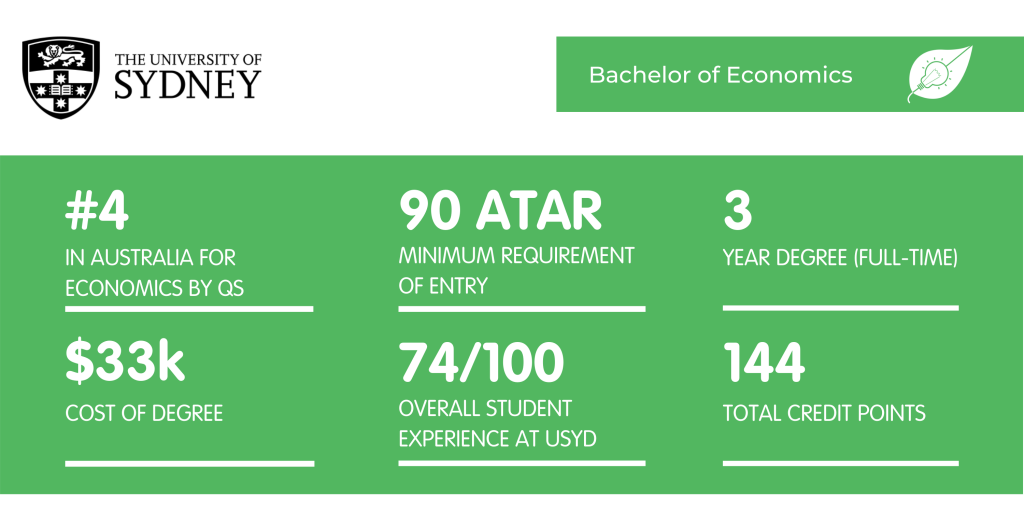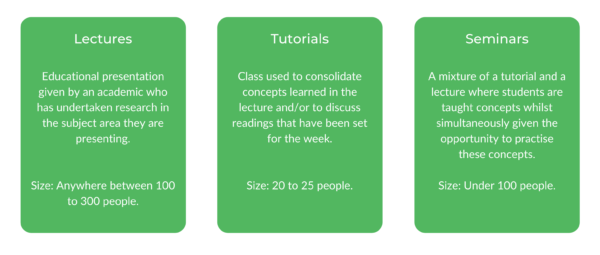Keen on studying a Bachelor of Economics at USYD?
Well lucky for you, because we’ve got all the nitty-gritty you need to know! From core units, to lectures and tutorials, to societies and support programs – we’ve got you covered.
Let’s get started!
What is a Bachelor of Economics at USYD?
Core Units and Majors
How to Get into a Bachelor of Economics at USYD
What’s the Teaching Format?
What’s the Faculty and Culture Like?
What is a Bachelor of Economics at USYD?
A Bachelor of Economics at USYD is the study of modern economics, econometrics and financial economics which focuses on the behaviours of individuals, businesses, industries, governments and countries across the globe. Essentially, economics attempts to understand the behaviour of individuals in a logical way, and then applies this understanding of human behaviour to the world around us.
This degree at USYD will also provide you with a critical understanding of the major challenges the world is currently facing, such as recession, poverty and global warming. Apart from ranking in the Top 5 universities in Australia for Economics, studying this degree at USYD will enable you to be significantly sought after, as many USYD Economics graduates are currently leaders in the Reserve Bank, the Treasury and numerous other international agencies and financial institutions.
Can I study a Bachelor of Economics with another degree or as honours?
Yes! A Bachelor of Economics at USYD allows you to combine your degree with:
Bachelor of Economics and a Bachelor of Advanced Studies – where you will undertake advanced coursework, complete a second major and experience community or professional project work.
Honours
USYD’s School of Economics allows you to complete honours from second year, but it’s also available to do in third and fourth year. The Economics or Econometrics Honours program is built up of advanced microeconomics and macroeconomics courses that will allow you to strengthen your skills in mathematics and data analysis, therefore it’s only offered to high-achieving students (those with a distinction average).
This Honours program is particularly challenging, but will undeniably develop your problem solving, presentation and writing skills – all of which are imperative in the real-world economics industry.
Career Paths
Economics at USYD is a very broad subject area; broader than most people realise. USYD Economics graduates can land themselves in multiple career paths, including:
-
- Accountant
- Banker
- Business consultant
- Business information systems analyst
- Economic analyst, economist
- Financial manager
- Human resource manager
- Industrial relations specialist
- Researcher
- Social policy adviser
Core Units and Majors
In first year, you will have to undertake the following core units:
| Unit Name | Description |
|---|---|
| Introductory Microeconomics | You’ll learn how to understand the economic decisions of households and individual firms in markets. |
| Introductory Macroeconomics | You’ll become familiar with analysing employment levels and economic activity in the economy overall. |
| Introduction to Economic Statistics | In statistics, you’ll learn how to use computer technology for statistical inference and data description. This subject is known to be pretty hard if you aren’t good at maths. |
| Introduction to Econometrics | Econometrics will introduce you to the classical linear regression model (CLRM) and the problem of estimation in the economy. |
In these first year subjects, you’ll learn to recognise the economic and governmental situations that are currently occurring, and how they affect individuals in the economy despite whether they are aware of it or not. For example, most people have a rough idea of what a central bank is, but these first year subjects will deep dive into what they actually do, how they go about doing it, and why it works or doesn’t work.
You’ll certainly attain an improved worldview of the global sphere of economics!
In second year, you will complete very similar core units but at an intermediate level. Your third year core units will depend on your major.
What are the Majors?
Within a Bachelor of Economics at USYD, you have to complete a core major from either:
-
- Economics
- Econometrics
- Financial Economics
- Environmental, Agricultural and Resource Economics
You can take a second major from another one of the above, or from the USYD’s shared pool.
As Economics is apart of the Arts and Social Sciences Faculty (not the Business School, to many people’s disbelief), your second major can be from a completely different field of study that may interest you such as History, Film Studies, American Studies, or Animal Health Disease and Welfare – to name a few. Or, of course in a related area like marketing or commerce. You decide!
Are there built-in internships?
There are no built-in internships, work experience or placements in Economics, however the USYD CareerHub (USYD’s own job and career seeking website, which is only accessed by current students and graduates) often has numerous economics or econometrics related internships available for students or graduates.
How to Get into a Bachelor of Economics at USYD
The ATAR cut off for a Bachelor of Economics at USYD is an ATAR of 90. You can find other admission pathways into a Bachelor of Economics here.
If you don’t get the required 90 ATAR, but manage to get an ATAR of 80, you can enrol in a Bachelor of Arts and major in Economics. This is a really good alternative as you will still be able to complete the core units that a Bachelor of Economics requires.
However, after one year of study if you decide you really want to complete a Bachelor of Economics, you can apply to transfer with that year’s results taken into consideration.
Prerequisites and Assumed Knowledge
The prerequisite for this degree is Mathematics. It’s recommended you have a pretty thorough and accurate understanding of mathematics for an economics course (such as having done Mathematics Advanced in the HSC), as subjects like Statistics can be particularly difficult for those without that already assumed knowledge.
If you don’t have this prerequisite, you can complete the Massive Open Online Course (MOOC) for Mathematics and the post-MOOC exam, or enrol in another course that doesn’t have a prerequisite of Mathematics and apply to transfer from that (like a Bachelor of Arts). For more info visit Mathematics course prerequisites.
What scholarships are available?
The School of Economics at USYD has the following scholarships available for economics students:
-
- Scholarship for Research Addressing Social and Economic Disadvantage: Worth $5000, eligible for students studying a Bachelor of Economics in their honours year.
- The Mary Henderson (Gerstle) Undergraduate Scholarship in Economic History: Worth $8000, eligible for any Bachelor of Economics students who have a credit average.
- The Sandra Cadwallader Indigenous Economics Scholarships: Worth $50,000 for course duration, eligible for any Australian or Aboriginal and Torres Strait Islander students enrolled in a Bachelor of Economics.
For more info about scholarships for students in the Arts faculty, visit here!
What’s the Teaching Format?
A Bachelor of Economics at USYD is taught through lectures, tutorials, and seminars across two semesters per year.
Each unit typically has two hours of lectures, followed by a one hour tutorial and the odd two hour workshop/seminar (depending on the unit). Lectures of compulsory economics subjects are also quite large, with around 300 people.
Tutorials have usually around 20 students, and are often not compulsory. However, it is recommended to attend them so you’ll be able to engage more with your learning – you don’t want to fall behind.
When you do have a tutorial in first year, the workload often consists of maths questions to solve individually, rather than in groups (which is what you’ll often see in Arts subjects). In second and third year you will only have lectures and seminars, which will involve open question time at the end of each class.
The number of contact hours is usually around 12 hours a week (for four units of study a semester), depending on your chosen subjects.
What are the assessments like?
The good news is that you’ll definitely have a lot less assignments compared to other students in the Arts faculty, but the bad news is that these make up in exams.
Most assessments in all economics subjects involve a mid-semester exam (weighing 30% of your final grade), an essay (weighing 20% – depending on the subject) and a final end of semester exam worth 50% of your final grade. The more maths-based subjects will also have quizzes.
Skills That You Refine and Learn
A Bachelor of Economics at USYD will not only provide you with the necessary problem solving and critical thinking skills needed for a career in accounting, banking, or in the finance world as a whole, but it will also enhance your writing, presentation and time management skills. Your ability to analyse data and mathematical skills will also be undoubtedly enriched!
What’s the Faculty and Culture Like?
Faculty
The Economics Faculty primarily consists of Honours students and international tutors. The faculty overall is very large, as economics is so broad and crosses over with many degrees – unfortunately this means you won’t really get to know too many people.
After first year, your cohort will split into two separate streams – one for potential honours students, and one for those who won’t do honours.
The honours stream is undoubtedly tough, but due to the small number of students completing it the cohort becomes close and people are able to form friendships. This is particularly important as you’re able to support each other through the struggles of honours!
Culture
As mentioned previously, a lot of students take economics subjects. Sadly, this often results in the inability to establish a sense of culture between students.
However, studying economics does allow you to join societies like the Sydney Uni Economics and Econometrics Society (EconSoc), which provides support, careers and educational assistance and social networking opportunities with members of private and public financial industries for all students interested in economics and econometrics. And for those wanting some fun – there are trivia nights, back-to-sem drinks and interfaculty pub crawls!
Support Programs
USYD’s Faculty of Arts has student support and development programs available for Economics students that may be finding it difficult to navigate their studies. These can be accessed on their student website, which include programs to improve your academic performance, what to do if you’re struggling and need advice, planning your degree and many more.
They also have a career planning program, called the ArtSS Career-Ready program, which involves workshops to develop your resume and cover letters, interviewing and communication skills and be able to hear from successful graduates who are currently in the workforce.
Of course, if you’re ever needing support for your health and wellbeing, there are numerous counselling and psychological services available for free to all USYD students.
Want to know more? Discover the pros and cons of a Bachelor of Economics at USYD here!
Isabelle Plasto is a Content Writer at Art of Smart Education and in her third year of a Media and Communications degree at the University of Sydney, majoring in Digital Cultures. You can find her work published in Dementia Australia’s August 2020 eNewsletter, an organisation very close to her heart. Apart from writing, Issy loves to travel, cook and boogie to 70s disco music.






